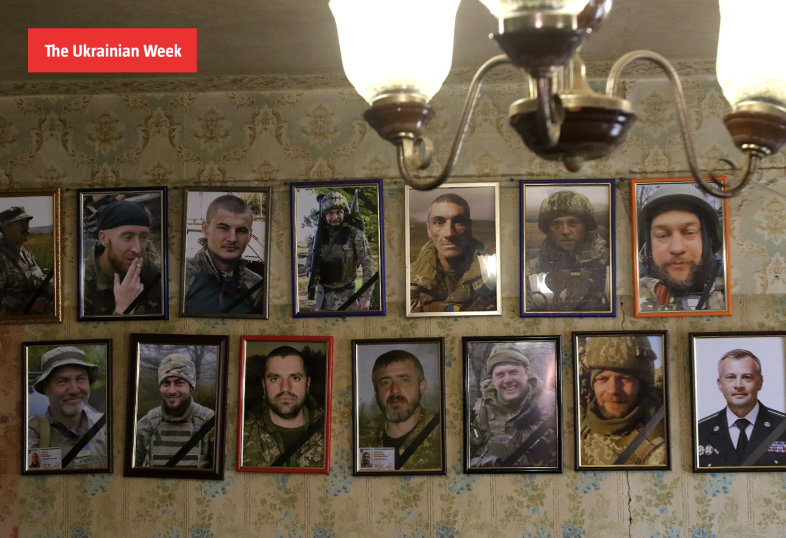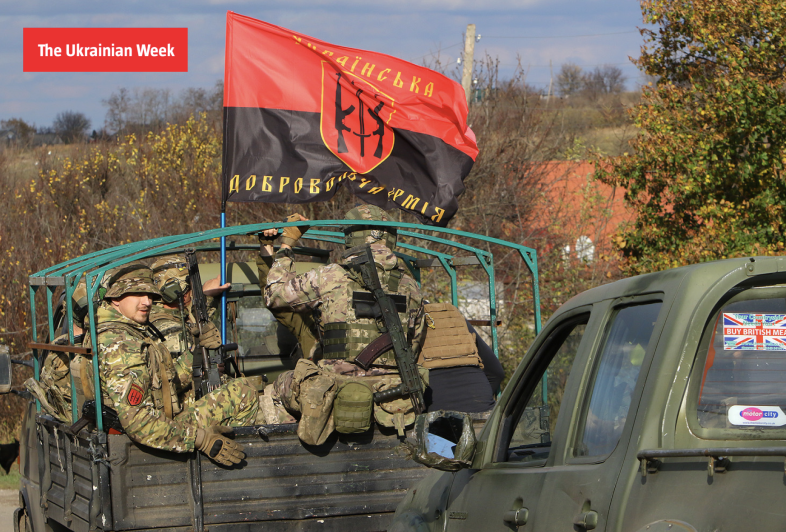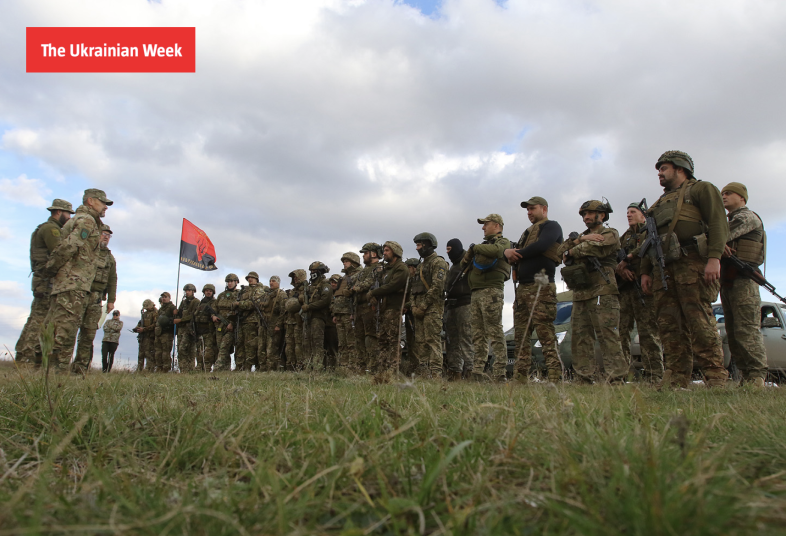“When we arrived in Bakhmut, it was a bit rough at first, for a couple of days. But we quickly adapted,” reminisces Sanych, also known by his civilian name Oleksandr Bondar. Sanych is a Commander of the Ukrainian Volunteer Army’s (UVA) South Unit, within the 28th Separate Mechanised Brigade of the Ukrainian Armed Forces. “We were stationed just 70 meters away from the occupiers [Russian soldiers – ed]. We had potbelly stoves. Our lads were there, grilling sausages, exchanging shouts with them [Russian soldiers – ed.]. We even had a girl, a soldier, with us who’d step out and shout Ukrainian slogans at them.”
“But you know, it’s not always this easy; it varies depending on which positions we’re holding,” the commander elaborates. “Positions, they’re windbreaks, typically. But only in its name. The ground is already torn up. Sometimes, you find bones, remnants, and all sorts. The stench of their [Russian soldiers – ed.] bodies lingers. They don’t even bother to remove their own deceased. There’s a pile of them left behind. Even when we seize their positions, the stench of decay hangs heavy.”
“In essence, it all boils down to which neighbouring [friendly – ed.] unit is standing nearby,” explains Sanych. “Their support is crucial. If they’re coordinated and we’ve established good communication with them, then things go smoothly. But if not, [Russians – ed.] could flank us, and that’s game over. So, our first step is always to establish communication and cooperation with adjacent units before we take our positions.” In the early stages, when coordination was lacking, Ukrainians lost many positions. “We even found ourselves surrounded once,” recalls Sanych. “That’s when my commander, my friend Palankovyy (Viktor Sharyy), was killed. The neighbouring left us exposed, and the Russians launched their attack. We initially mistook them for our own, but they were gone. We were trapped, and it wasn’t until evening that we managed to get the commander’s body out through the pipes in the water.”
No matter how challenging it gets, UVA soldiers make every effort to retrieve their fallen comrades from the battlefield right away. “It’s about giving them the final respect they deserve so their parents can lay their children to rest. It’s an unspoken rule for us, one we always try to follow,” explains Sanych. “Here are our losses,” he gestures toward the wall adorned with over a dozen photos of fighters. “We see them every day, remembering how they died, and we know we owe it to each of them to seek revenge.”

Photo: Roman Malko
Navigating through the trenches
The South Unit of the UVA near Bakhmut had been in operation for over a year. Following the death of Colonel Serhiy Ilnytsky, also known by his call sign Sokol, on August 22, 2023, Sanych assumed his role. We met not far from Bakhmut as the UVA South was gearing up to resume operations. On that day, there was a planned award ceremony for soldiers who had distinguished themselves in battle. “It’s been a year already in Donbas, but we hardly notice,” says Sanych. “It’s always either one thing or another. In combat, time flies by quickly. You don’t even realise what day it is. We don’t keep track of that. Since the war started, it’s been one continuous, drawn-out day.”
“When the guys head into their positions, they’re going in to fight,” says Sanych. “But they can’t stay there indefinitely. Three, four days tops. We move in when there are issues, sort them out, and then we’re out. But some units just go in to kill time. They set up, bunker down, and wait it out. All they care about is getting through it quickly; whatever comes next is someone else’s problem.” The commander firmly believes that you can’t win a war with this mindset. He argues there’s no use in finding excuses not to act. Instead, you need to figure out how to “accomplish the mission, keep your people safe (that’s the priority), so we can then take further steps and move ahead.”
He continues: “I’m of the opinion that if we stay purely defensive, it’ll turn into a stalemate, and they’ll have the upper hand. It plays to their strengths because they have the manpower; they can throw it around recklessly. That’s why we need to switch our strategy,” Sanych asserts.
“There was this one instance,” he recalls, “where we were let down by a neighbouring unit supposed to replace us. Someone told them that we were wiped out and our positions were already taken.” Consequently, Sanych and his comrade Djokonda spent the entire night, nearly seven hours, fending off the Russian assault with grenades and a machine gun. “I had a thermographic camera, guiding Djokonda where to aim,” he recounts. Both men hesitated to leave their positions at night for fear of being mistaken for the enemy by their own comrades. It wasn’t until dawn, when an enemy sniper wounded Djokonda in the arm, that they decided to break out. “I was shouting to everyone that we were abandoned. It’s only because we had plenty of grenades that we managed to hold them off,” says Sanych. “I had this beautiful American grenade that I always kept for myself. But then I thought, what’s the point? I need to use it. My friend Sova, from Sambir, once told me, “Just throw this grenade at the Russians, why do you keep it for yourself? Throw it there. Everything you have should be thrown in there. Even the last bullet should go there too.”

Photo: Roman Malko
“Djokonda has already been wounded four times,” Sanych chimes in. “In the South Unit, he’s the machine gunner. Before the war, he used to decorate churches; he’s a graduate of the Institute of Fine Arts.” “And let me introduce another mate,” Sanych adds, “Our buddy, Stalker, used to work at a car repair shop, and Troll over here was a freelance English and German translator. But here, he picked up the trade of a machine gunner. They moved him to headquarters after he got hit twice. Some of them were builders on construction sites, some were journalists.”
Those who mobilised and those who stayed
Sanych himself served as a commandant of a military town at the military academy before the war. He spent a decade in that role but never signed a contract with the Armed Forces. However, as soon as the war broke out, he willingly reported to the military enlistment office. “I had body armour,” he recalls, “I was a commandant, could’ve easily dodged as many people did.” Despite this, he returned to his academy, where they questioned his decision, saying, “What are you doing? You have the right not to go.” “But you see,” Sanych replied, “there was a woman running around with a gun. If she can do it, why can’t I? I’ll learn,” I insisted, “everything will be fine.” “When the enemy attacks our country,” Sanych concludes, “every man should take up arms and go. There’s no need for motivation. It should be a given.”
However, the commander doesn’t criticise those who are reluctant to fight and evade military service. “I even have friends who still find ways to dodge, sneaking past checkpoints to avoid getting summoned. They’ve even set up pages on Telegram channels, advising others on how to do the same. It’s their call. But when the time comes, and heaven forbid, we’re gone, then it’ll be their turn. I don’t pretend to understand this, but I won’t pass judgement. Everyone’s got their own path, and everyone makes their own decisions, but their support would certainly come in handy now.”
“Some say they [civilians, who have not been enlisted yet. – ed.] will donate or do something else,” continues Sanych. “Even if they’re not actively involved right now, they should still train and acquire basic military skills, whether it’s learning about weapons, operating drones, or undergoing tactical medicine training. Eventually, everyone will likely find themselves needing these skills. It certainly wouldn’t hurt to be prepared,” adds Sanych.
“I reckon sooner or later, everyone will end up in the thick of it because things are only going to get tougher. We don’t have the manpower to rely solely on positional defence and hold our ground. People are still leaving – the ‘300’, the ‘200’ [“cargo 200” is a military code for “dead”, and “cargo 300” – for “wounded” – ed.] at a time. Not in the same numbers as the occupiers, but they have a larger pool of potential recruits. They can replenish their losses with ease. And right now, our most precious resource is our personnel. In my opinion, we need to reconsider our war strategy, rethink our approach, and adapt,” explains Sanych.
“In the beginning, I personally believed,” admitted Sanych, “that everything would unfold just as we were informed – that we’d smoothly and swiftly wrap it all up.” It wasn’t until later, as the summer arrived and I began to engage in combat (my inaugural combat experience was towards the end of May), that I truly grasped the gravity of this war, this harsh reality. It wasn’t at all what I had envisioned. That’s when it dawned on me that it wouldn’t be a quick resolution for us,” he says.
Technical advantage is the key
“Recently, there’s been a surge in enemy aerial reconnaissance around Bakhmut,” remarked Sanych, Oleksandr Bondar. “They’ve got it all dialled in, with their “lancets” [Russian drones –ed.] fully operational. When some call Russians stupid and clueless – that’s just not true. They’ve got their setup down solid. There’s plenty of artillery and their “birds” [drones – ed.] constantly adjusting their positions in the air. We’re on the lookout for drones, and they can lose 3-4 in a single day because they’ve got plenty of them. But this directly impacts the lives of our soldiers. That’s why it’s crucial for our radio communication, electronic warfare (EW), and EW reconnaissance to be operating at full throttle. And at the national level, the production of all this gear needs to be ramped up on an industrial scale, no question about it,” Sanych insists.
“But it’s not just that,” he pressed on. “We gotta get our batteries up and running, and we’re desperate for more mortar ammunition. Getting only 5 mines per day for a mortar… That’s… Well, even though five mines a day isn’t too bad, there are times when we get nothing at all. There have been months where we’ve only received a total of 30 mines, which barely scratches the surface of what our unit needs.”
“Today, it’s already too late to say this, but Ukraine should’ve ramped up its military production since 2014,” the commander emphasised. “We wouldn’t be scrambling for assistance from other countries right now. They don’t provide us with the quantity of ammunition we need, even for a counteroffensive. For instance, we request a hundred missiles, but they only supply us with 20, mostly for defensive purposes. If they delivered what we asked for, or at least what they promised, then we could turn the tide.”
“You can’t let fear overpower you”
Sanych didn’t plan on becoming a commander. It wasn’t the goal he set for himself. He simply did his job, and that was it. But sometimes, he mused that if he ever found himself leading a unit or something similar, he’d strive to rectify the mistakes he observed from a soldier’s perspective. “Because it’s not the equipment that secures victory, it’s the people. But the guys are just waiting to wipe the floor with you,” he chuckled. “We need to shake them off sometimes; they sense our weakness immediately.”
When asked about fear and how to handle it, Sanych responds that fear is a natural and constant companion during war. Anyone who claims they’re not afraid is lying. “It’s always terrifying, but you have to find a way to master and control it. You can’t let fear overpower you; you have to be the one in control.” Some people manage to do this right from the start. Others need one, two, or even three real-time battles to get there. And then there are some who simply can’t cope. They become paralysed, and that’s it. They can’t confront their fear.”
“Once, we had to provide cover for another unit,” Sanych recalls. “They deviated from the plan and came under heavy [Russian –ed.] fire, so our unit stepped in to shield them. But then the machine gunners ran out of ammo. We needed to resupply them, but the soldier tasked with passing the ammunition to Djokondi couldn’t do it — he got scared, cowered in a trench, and refused to come out. However, the rest of the guys performed admirably; they fought off the enemy’s attacks. We lost one comrade — Quiet Friend was killed, and another one, Brigadier Friend, the platoon commander, was seriously wounded. They had to carry him out.”
Sanych emphasises that such situations are commonplace and should be regarded as such. Within the unit, it’s understood that there’s no need for mockery because we’re all human. On the contrary, it’s about offering support, having discussions, and providing explanations, but never diminishing or condemning. Because one person might grasp the situation after one battle, while another might need a bit more time. “It’s only through experiencing battles that the guys toughen up and start to yield results,” the commander explains. “But if you immediately start mocking or criticising them, they’ll burn out and either quit or, God forbid, do something reckless. You have to understand and empathise with the fighters.”

Photo: Roman Malko
“After a battle,” Sanych continues, “I sometimes spot a bloke who’s not himself. I go up to him and ask what’s bothering him. Then the platoon commander and I have a chat with him, and we unofficially give him five days off. He heads home to his family, has a bit of a break, comes back after five days, and he’s back to his usual self. In the UVA, we’ve got the leeway to do things like that, to give people a bit of emotional relief. If we hadn’t noticed and acted in time, we could’ve lost that person.”
“God willing, I’ll live to see Victory Day”
Sanych hails from the left bank [of Dnipro river – ed.] of the Kherson region. His two sisters and mother ended up in the occupied territory at the start of the war. By October 2022, he had managed to bring his sisters out, and he had already arranged for his mother to be transported via the Zaporizhzhia direction. However, the Russians were forced to withdraw from Kherson, and his mother changed her mind about leaving. She reckoned that since Ukrainian forces were advancing, the left bank would soon be liberated, and her son would arrive, and everything would be fine. Sadly, it didn’t turn out that way. Later, the route to Zaporizhzhia was blocked, and his mother had to be evacuated via Crimea.
For a woman, remaining under Russian occupation posed serious risks. Sanych’s classmate, who later became his neighbour, betrayed her to the Russian occupation forces, leading to her interrogation about her son’s whereabouts. “All these scoundrels need to justify their presence somehow,” the commander remarks, “to extract concessions from Russians. But those will be their problems after the war. My mother and I had a plan. Since 1996, when I finished high school and left the village, I instructed her that if, God forbid, tough times were to come, she should say, “I don’t know where he is. When he left, he didn’t return, didn’t send money”, and so on. And when they approached her, she played her role because she was already prepared. Fortunately, they didn’t harm her,” explains the soldier.
“When people inquire about my plans after victory,” Sanych grins, “I typically jest that the first order of business is to refuel the car. God willing, I’ll live to see Victory Day, and my fervent hope is for as few of our comrades as possible to meet their end in a battle. That’s the priority. They deserve protection. As for what comes next after victory, we’ll take it as it comes.”
Sanych admits that he’s no longer certain if civilian life suits him. “When I took leave, I couldn’t settle for five days. It’s quiet, sure, but I find more comfort in the company of my comrades, tackling various issues, constantly immersed in combat tasks. They’ve got all sorts of problems back home… I mean, what problems? Everything’s alright. You’ve got life, you’ve got health, what more could you possibly want? Those aren’t problems; it’s all trivial. You haven’t faced or witnessed real problems yet. And your mind is always here. Sometimes my wife asks, “Where are you?” And I’m like, “I’m here.” “No, I can see you’re already somewhere else…”

